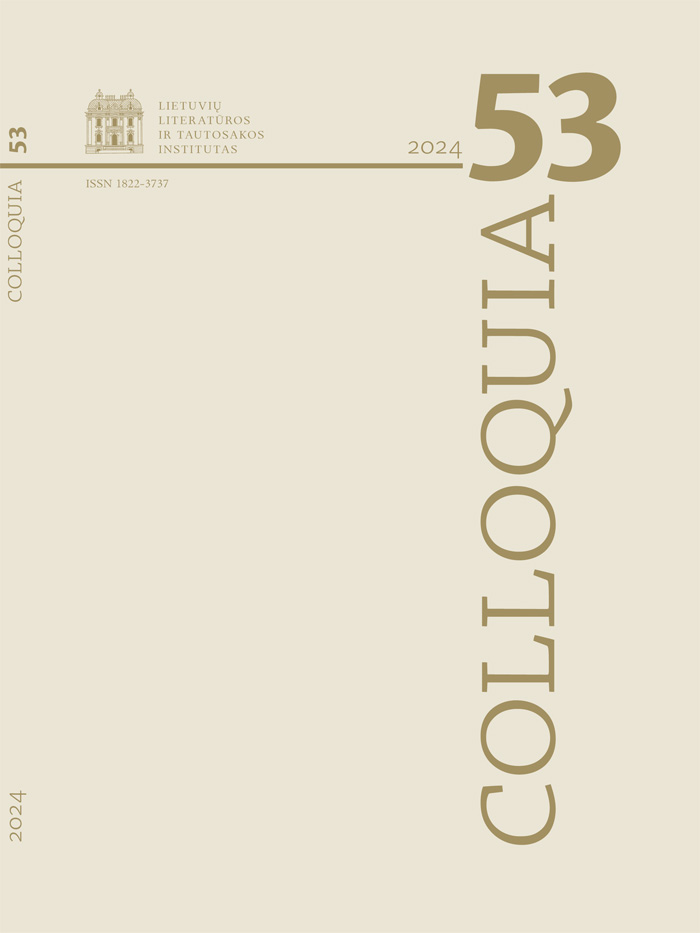Two Canonical Soviet Authors in the Post-Soviet Lithuanian School System: Petras Cvirka and Salomėja Nėris
Abstract
The article examines the place of two Lithuanian writers, Salomėja Nėris (1909–1947) and Petras Cvirka (1904–1945), in the high school canon of Lithuanian literature in the post-Soviet period. First, the canonisation of these writers in the Soviet Lithuanian school system is analysed, or more precisely, in school curricula and textbooks from that time. Afterwards, we examine the revision of their canonical position after the restoration of Lithuania’s independence (1990). The research applies the socio-cultural methodological approach of canon research. A large sample of sources is used: school curricula, textbooks, readers, press publications, and other contextual materials. The study has revealed the different evaluation of Nėris and Cvirka in post-Soviet schools, which is largely due to differences in writers’ biographies. Since Cvirka consistently held and expressed left-wing and later pro-Soviet views in his work throughout his life, his oeuvre gradually disappeared from the upper school curriculum as the de-sovietisation of Lithuanian culture took place in the late 20th and early 21st centuries. Nėris, on the contrary, has retained her central position in the school canon in the post-Soviet period. When her last collection of poems was first published in the late 20th century, in the order Nėris’ herself had wanted, it became possible to reposition certain aspects of her life and work.

This work is licensed under a Creative Commons Attribution 4.0 International License.
Downloads
Most read articles by the same author(s)
- Aistė Kučinskienė, Literary Scholars and Society: Between Marginalization and Elitism , Colloquia: Vol. 50 (2022): Colloquia
- Saulius Vasiliauskas, We Tried to Adhere to the Hippocratic Oath—Above All, Do No Harm! , Colloquia: Vol. 52 (2023): Colloquia
- Aistė Kučinskienė, Viktorija Šeina, Gitana Vanagaitė, Foreword , Colloquia: Vol. 53 (2024): Colloquia
- Saulius Vasiliauskas, Organization and Control of Lithuanian Literature Teaching in the Late Soviet Era , Colloquia: Vol. 54 (2024): Colloquia
- Raimondas Kašauskas, Saulius Vasiliauskas, „In My Youth, It Seemed Pretentious to Call Myself a Writer“ , Colloquia: Vol. 49 (2022)
- Aistė Kučinskienė, Jūratė Sprindytė, Virginija Cibarauskė, Jūratė Čerškutė, Rima Bertašavičiūtė, Apie doktorantūros studijas, laisvalaikį ir akademines erdves , Colloquia: Vol. 33 (2014)
- Viktorija Šeina, Ieva Simonaitytė – Cultural Dialogue Mediator , Colloquia: Vol. 38 (2017)
- Saulius Vasiliauskas, The Ambivalent Place of Leonardas Gutauskas in the Field of Lithuanian Literature , Colloquia: Vol. 41 (2018)
- Aistė Kučinskienė, About Birutė, Comparative Studies, Translation, and Hope , Colloquia: Vol. 46 (2021)
- Viktorija Šeina , The Dynamic of Maironis’s Canonization in Lithuanian Literary Criticism of the First Half of the Twentieth Century , Colloquia: Vol. 37 (2016)
